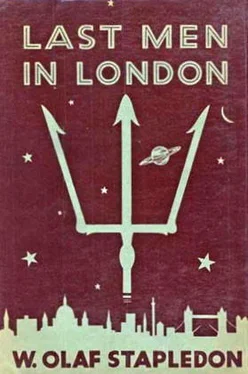Of the innumerable constructors, the engineers, architects, chemists, many were using their powers merely for gladiatorial victory. Even those who were sincere workers had but the vaguest notion of their function in the world. For them it was enough to serve faithfully some imposing individual, some firm, or at best some national State. They conceived the goal of corporate human endeavour in terms of comfort, efficiency, and power, in terms of manufactures, oil, electricity, sewage disposal, town-planning, aeroplanes and big guns. When they were not at work, they killed time by motor-touring, the cinema, games, domesticity or sexual adventures. Now and then they registered a political vote, without having any serious knowledge of the matters at stake. Yet within the limits of their own work they truly lived; their creative minds were zestfully obedient to the laws of the materials in which they worked, to the strength and elasticity of metals, the forms of cantilevers, the affinities of atoms.
Of much the same mentality, though dealing with a different material, were the doctors and surgeons; for whom men and women were precariously adjusted machines, walking bags of intestines, boxes of telephone nerves, chemical factories liable to go wrong at any minute, fields for exploration and fee-making, possible seats of pain, the great evil, and of death, which, though often preferable, was never to be encouraged. They were familiar equally with death, and birth, conception and contraception, and all the basic agonies and pities. They protected themselves against the intolerable dead-weight of human suffering, sometimes by callousness of imagination, sometimes by drink or sport or private felicity, sometimes by myths of compensation in eternity. A few faced the bleak truth unflinchingly yet also with unquenched compassion. But nearly all, though loyal to the militant life in human bodies, were too hard pressed to be familiar with the uncouth exploratory ventures of human minds. And so, through very loyalty to life, they were for the most part blind to the other, the supernal, beauty.
Even more insulated, those very different servants of human vitality, the agriculturists, whose minds were fashioned to the soil they worked on, lived richly within the limits of their work, yet were but obscurely, delusively, conscious of the world beyond their acres. In the straightness of their furrows, and the fullness of their crops, in their sleek bulls and stallions, they knew the joy of the maker; and they knew beauty. But what else had they? They had to thrust and heave from morning till night. They had to feed their beasts. Brooding over their crops, dreading floods and droughts, they had not time for the world. Yet they enviously despised the town-dwellers. They censured all newfangled ways, they condescended to teach their sons the lore of their grandfathers, and they guarded their daughters as prize heifers. They put on black clothes for chapel, to pray for good weather. They believed themselves the essential roots of the State. They measured national greatness in terms of wheat and yeoman muscle. The younger ones, town-infected with their motor-bicycles, their wireless, their artificial silks, their political views, their new-fangled morals, revolted against enslavement to the soil. Both young and old alike were vaguely unquiet, disorientated, sensing even in their fields the futility of existence.
Most typical of your isolation from one another were the seamen, who, imprisoned nine parts of their lives in a heaving box of steel, looked out complainingly upon a world of oceans and coasts. They despised the landsmen, but they were ever in search of a shore job. Monastic, by turns celibate and polygamous, they were childlike in their unworldly innocence, brutelike in their mental blindness, godlike (to Paul’s estimation) in their patience and courage. They loved the flag as no landsman could love it. They were exclusively British (or German or what not) but loyal also to the universal brotherhood of the sea (or disloyal), and faithful to the owners (or unfaithful). Day after day they toiled, shirked, slandered, threatened one another with knives; but in face of the typhoon they could discover amongst themselves a deep, an inviolable communion. They measured all persons by seamanship, crew-discipline, and all things by seaworthiness and ship-shapeliness. They took the stars for signposts and timepieces, and on Sundays for the lamps of angels. Contemptuous of democracy, innocent of communism, careless of evolution, they ignored that the liquid beneath their keels was but a film between the solid earth and the void, but a passing phenomenon between the volcanic confusion of yesterday and the all-gripping ice-fields of tomorrow.
Seemingly very different, yet at bottom the same, was the case of the industrial workers of all occupations and ranks, whose dreams echoed with the roar of machinery. For the mass of them, work was but a slavery, and the height of bliss was to be well paid in idleness. They loudly despised the wealthy, yet in their hearts they desired only to mimic them, to display expensive pleasures, to have powers of swift locomotion. What else could they look for, with their stunted minds? Many were unemployed, and spiritually dying of mere futility. Some, dole-shamed, fought for self-esteem, cursing the world that had no use for them; others, dole-contented, were eager to plunder the society that had outlawed them. But many there were among the industrial workers who waited only to be wrought and disciplined to become the storm troops of a new order. Many there were who earnestly willed to make a new world and not merely to destroy an old one. But what world? Who could seize this half-fashioned instrument, temper it, and use it? Who had both the courage and the cunning to do so? Seemingly only those who had been themselves so tempered and hardened by persecution that they could not conceive any final beatitude for man beyond regimentation in a proletarian or a fascist State.
Certainly the politicians could never seize that weapon. They climbed by their tongues; and when they reached the tree-top, they could do nothing but chatter like squirrels, while the storm cracked the branches, and the roots parted.
The journalists? Was it they who could fertilize the waiting seed of the new world? Little seekers after copy, they made their living by the sale of habit-forming drugs. They had their loyalties, like the rest of men; but they trusted that in preserving the tradition of the Press, or in serving some great journal, they served well enough. They ignored that in the main their journals spread poison, lies, the mentality of society’s baser parts. They made sex obscene, war noble, and patriotism the height of virtue. A few there were of another kind, who sought to bring to light what the authorities would keep dark, whose aim it was to make men think by offering them sugared pills of wisdom, spiced problems of state-craft, peepshows of remote lands and lives, glimpses of the whole of things. They were indeed possible trumpeters of a new order, though not world-builders. But they were few and hobbled, for at every turn they must please or go under. And the thought which they so devotedly spread was of necessity over-simplified and vulgarized, to suit the spirit of the times.
The civil servants, could they remake the world? Wrought and tempered to a great tradition of loyalty, they were devoted only to the smooth-running and just-functioning and minor improvement of the social machine.
The social workers, so formidable with eye-witnessed facts, so indignant with the machine, so kindly-firm with ‘cases’, so loyal to the social gospel, and to the fulfilling of personality, so contemptuous of cosmical irrelevances, and morally outraged by those who, even in a foundering world, have an eye for beauty! They had their part to play, but they were repairers, physicians, not procreators of a new world.
Читать дальше












